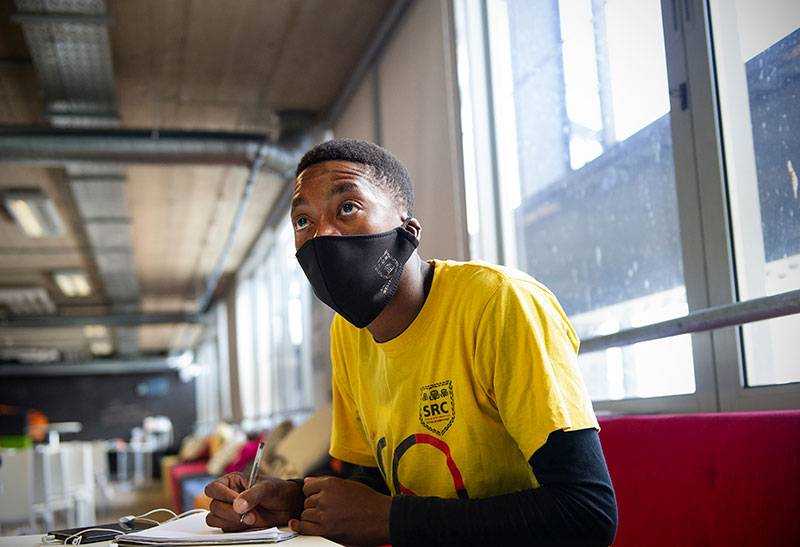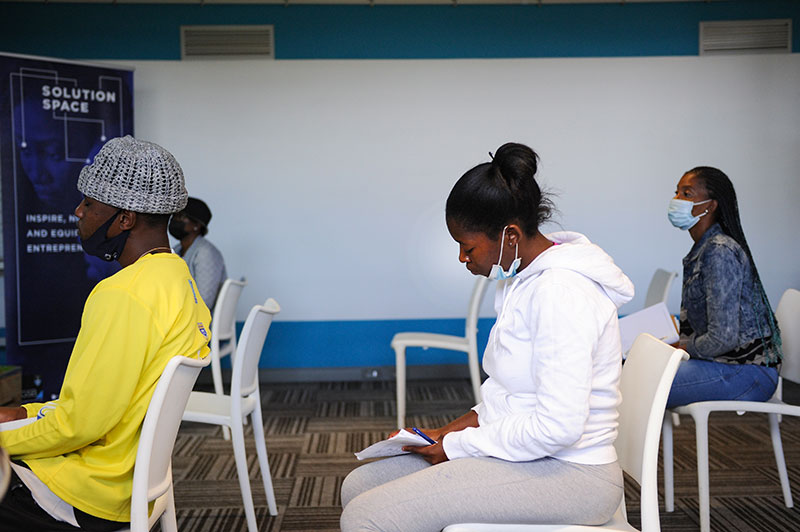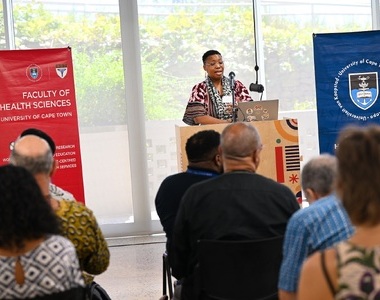Philippi Hub a vital platform for new Summer School audiences
15 March 2022 | Story Helen Swingler. Photos Lerato Maduna. Read time 10 min.
A review of the University of Cape Town’s (UCT) first “phygital” Summer School, a combination of live and digital presentations and classes, has shown that its new base at the Philippi Hub has the potential to become a valuable platform for reaching new audiences of lifelong learners.
This community satellite drew “overwhelming interest” from the community with more than 250 applicants. The venues were made available by the UCT Graduate School of Business’s (UCT GSB) Solution Space at the hub, and their team used existing relationships with local business partners to advertise the courses.
While COVID-19 regulations meant only 120 applicants could be accommodated (with most venues limited to 15 people per session), these participants were able to connect with the university, most for the first time, said Dr Medeé Rall. Dr Rall is the head of the Centre for Extra-Mural Studies (EMS) in the Development and Alumni Department.
Learning for all
Rall sees the hub as a vital platform for realising the Summer School’s mandate, captured in their mission “Open Learning for All”, regardless of their educational background, or where they live.
“In Philippi, we were able to reach communities we couldn’t before.”
“The role that Summer School can play in helping to transform UCT into a more inclusive university, part of Vision 2030, is immeasurable,” she said. “In Philippi, we were able to reach communities we couldn’t before, both in terms of regular audiences and in terms of a working project to put our work in reach of resource-poor communities.”
EMS senior education specialist, Dr Zuleiga Adams, and senior intern, Lindokuhle Patiwe, worked on the outreach programme to embed Summer School in these communities. As part of this, lectures were also live-streamed to Ikamva Labantu, a community-driven NGO that delivers social support services to underprivileged communities in Cape Town.

To address the challenge of internet resources for potential participants, the Solution Space team adopted a pragmatic approach to registration, said Rachel Briant, on behalf of the Solution Space.
“Many [participants] do not have internet access or even an email address. So, we made use of tools such as WhatsApp and in-person registration.”
Briant said the team were already looking forward to growing and evolving the programme to better meet the communities’ needs. Feedback from participants had shown a need for practical courses; skills that will help job seekers and lead to learnerships and internships, she said.
Phygital combo
On campus, there was a good response to live classes and lectures, said Rall, but still without the full “buzz” of Summer School.
“But going online has now made it possible for more people from around the world, particularly alumni, to experience Summer School’s intellectual richness.”
Regarding the combination of live and digital participation, Rall cited three key statistics:
- Two-thirds attended online and one-third in person. “We weren’t yet back to our normal [in-person] numbers,” she said. Limited numbers in venues, prescribed to prevent COVID-19 infections, also affected in-person attendance.
- 53% of participants were alumni, who signed up from all over the world thanks to online offerings. “And that’s a substantial group of people who are getting something important from the university,” added Rall.
- 15% of participants were under the age of 50.
Young Summer School champions
The phygital Summer School seems to be the optimum model, Rall said. She and her team hope that the online offerings will help to grow the younger audience they are keen to attract and develop into lifelong learners who return to Summer School year after year.
One of Summer School’s champions in this is young UCT alumnus and participant Faheem Seedat. Seedat first noticed Summer School in 2019. Curious about ‘school’ during the middle of January and in need of stimulation, he scouted it out. It was a course on artificial intelligence that hooked him.
“I knew Summer School existed. [But] I’m the kind of person who likes to go somewhere I haven’t been before, where I don’t know what to expect.”
His impressions? Plenty of older people, he said, but after attending a few lectures he started having fun.
“I enjoyed the conversation and the company. There were enough people to create a vibe [this was pre-COVID-19] and not too many to ‘subdue’ what was happening, which is learning and expanding yourself.”
“I’m a believer in the interaction and energies that play out in real space.”
And the in-person classes were a break from online learning.
“I’m a believer in the interaction and energies that play out in real space; the lecturers in front of you. Having their full essence around the room … it makes a huge difference. The environment was much more relaxed and open; you’re free to take in whatever you’re particularly interested in at that moment.”
Seedat is keen to market the course to other young alumni and friends, and to contribute ideas to attract a younger audience – people keen to learn, to visit UCT’s campus and be a part of the community.
He sees opportunities linked to creating experiences for people around the core elements of Summer School. This year’s heritage tours and guided walk to the Cape Muslim and Slave Heritage Museum were very successful. Seedat thinks this is the kind of activity the team could build on; new facets of the programme to attract different audiences.
He believes new business models have become more focused on communities, dialogues, platforms and networks.
“Whether it’s a [Summer School] live stream to Philippi, they are making and impact,” he said.
“Summer School already has that strong foundation. It’s just to build on that.” And while COVID-19 has been a major disruptor, Seedat is already thinking: “How do we strategise a reopener for Summer School?”

Staying hybrid
Rall said that the team had learnt important lessons this year – including the need to offer flexibility.
“We will definitely stay hybrid. We discovered even the language and art courses worked well online.”
But the aim is also to reclaim the more social aspects of in-person attendance, with coffee shops, book stalls and meeting places.
This is what regulars miss most. Online can be lonely, said Rosemarie Saunders, who has been coming for 44 years. Another regular attendee, Suzette Raymond, said the attraction remains the “wonderful, interesting courses from top lecturers on offer every year”.
While she participated on MS Teams last year (“there was no other choice”) she was back on campus in January, “enjoying the experience of being at UCT and the interaction with other people attending the courses and chatting to the lecturers”.
Another regular, Anna Maria Delle Donne, has attended 15 seasons of Summer School, attracted by the variety and depth of courses.
“They broaden my mind. I generally choose subjects I like. But what Summer School also does is encourage me to attend lectures that stretch my mind. But the physical attendance is important.”
So too for stalwart Summer School volunteers such as Gill Rose and Terrill Nicolay.
Rose has been a volunteer for seven years.
“All the in-person attendees were thrilled to be back,” she said. “It was a pity that the bookshops left, and the food and drink options were reduced as time went on, so the atmosphere of the past wasn’t there. But everyone who turned up was glad to be there.”
Being a volunteer also has advantages. “It means that I have to be there every day and can attend as many lectures as I like. I am not a specialist in anything but I’m a keen reader of fiction and non-fiction and as a school librarian I need to know a bit about everything, so Summer School is absolutely wonderful.”
There is also contact with attendees, many of whom had become friends over the years, she said.

Nicolay was part of the EMS team as a contract member for almost 20 years and has been a volunteer since 2016. She has a lifelong commitment to education and until 2019 chaired the Western Province branch of the NPO SA (South Africa) Council for English Education.
“I enjoy the stimulation of an academic environment and relating to people with similar interests,” she said. “Over the years I have made many friends among the lecturers and Summer School students and have enjoyed a very cordial working relationship with the head, Dr Medeé Rall.”
She is committed to Summer School and its future, she said.
“It has, over its 70-plus years of existence through turbulent times in South Africa, made a highly significant contribution to the intellectual life not only of the people of Cape Town but to the university’s international reputation. Every effort should be made to allow it to adapt to the new environment in which it finds itself.”
To capture this goodwill, Rall plans to work with a Friends of Summer School group, which was initiated by long-time lecturer Chris Danziger and a number of dedicated attendees. The aim is to help attract participants back on to campus, to help market Summer School and spread the word about the programme that is so important to them, said Rall.
 This work is licensed under a Creative Commons Attribution-NoDerivatives 4.0 International License.
This work is licensed under a Creative Commons Attribution-NoDerivatives 4.0 International License.
Please view the republishing articles page for more information.






























































































































































































































































































































































































































































